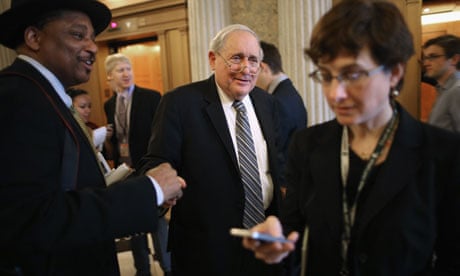After one of the lengthiest and most bitter confirmation fights in recent history, the Senate on Tuesday voted to confirm Chuck Hagel as president Barack Obama's next secretary of defense.
The Republican former senator from Nebraska and decorated Vietnam veteran will now replace Leon Panetta as head of the Pentagon at a time when America is seeking to draw down its ground forces in Afghanistan but ramping up its controversial drone warfare across the globe.
Just four Republicans crossed the political divide to back Hagel as he won a 58 to 41 vote in America's upper chamber. They were Thad Cochran of Mississippi, Mike Johanns of Nebraska, Richard Shelby from Alabama and, surprisingly, Tea Party favourite Rand Paul from Kentucky, who had been one of Hagel's staunchest critics.
The vote marks a long-delayed but important win for Obama who had placed some personal political capital on getting Hagel appointed to the post after reportedly receiving warnings that he could face a torrid time. Yet even those warnings had probably not prepared the White House – or indeed Hagel himself – for the intense grilling that the Nebraskan's former Republican colleagues would dole out over a broad range of issues.
They questioned numerous speeches he had given in the past, raised doubts over whether he had accepted payments from abroad and sought to portray him as weak on Iran and too hard on Israel.
One of the most implacable foes of the appointment was Texas Republican Ted Cruz, who is a newcomer to the Senate but is fast winning a vocal place on the party's right wing. In a statement Cruz continued to state his opposition to Hagel getting the military top job. "I fervently hope that this confirmation does not embolden Iran to accelerate their nuclear weapons development. I fervently hope that this confirmation does not undermine our vital alliance with Israel," Cruz said.
Democrats had attacked Republican stalling over the appointment as being motivated by party political interested and had claimed they were damaging America's national security interests.
Before the vote Senate majority leader Harry Reid had admonished his Republican opponents in stern language. "Politically motivated delays send a terrible signal to our allies around the world, and they send a terrible signal to tens of thousands of Americans serving in Afghanistan, other parts of the world and … in the United States," he said.
Hagel is a former infantry soldier who was awarded two Purple Hearts during the conflict in Vietnam. He is now the first enlisted man to ever lead the Pentagon. However, Hagel's first crisis on the job is not likely to be anything that happens overseas.
He is taking the reigns at the exact moment a fierce budgetary fight is raging in Washington over looming spending cuts, including to large swathes of the military. Defence chiefs have been warning that the planned cuts have already caused delayed deployments of manpower.

Comments (…)
Sign in or create your Guardian account to join the discussion